Research Areas
The Department of Entomology’s research programs consist of a portfolio of projects that apply diverse tool-sets, and varied disciplinary and interdisciplinary approaches, to address a spectrum of entomological and nematological problems. These problems range from pure discovery attempting to advance the forefronts of scientific knowledge to focused, mission-oriented investigations with the goal of applying scientific knowledge to solve a very practical and immediate problem.
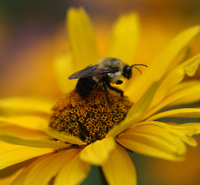
Arthropod Molecular Genetics and Genomics
Purdue is a leader in insect genetics and genomics advances in molecular biology are helping to address age-old questions, and new tools allow questions that were previously impossible to ask about the relationships between phenotypes and genotypes.
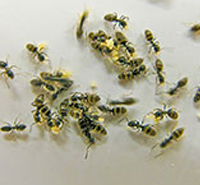
Pest Management
Pest management is one of the signature research areas of the Department of Entomology. Purdue has one of the premier urban entomology programs in the country. The urban entomology research encompasses such subjects as management of general and structural pests, food industry pest management, ornamental pest management, turfgrass pest management, forensic entomology, and vector biology. The Center for Urban and Industrial Pest Management is a model for university and industry partnerships. Crop and livestock pest management emphasizes traditional IPM practices such as pest biology, sampling, economic thresholds, cultural and biological control and evaluation of pesticides. Research also targets more modern IPM issues such as resistance management in GMO crops and the effects of biofuel production on IPM strategies. Several faculty are also involved in organic production systems.
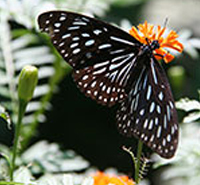
Host Plant Insect/Nematode Interactions
Purdue Entomology has a long history of nationally and internationally recognized research in the arena of insect/nematode interactions with host plants. Starting with basic field biology and Hessian fly in the 19th century, our portfolio has expanded over the years to include other insect and nematode pests, and has evolved to incorporate molecular capabilities in our investigations. Today, the department has a critical mass of researchers utilizing genomics, proteomics, and metabolomics to discover the genes and their functions that mitigate pest plant interactions.
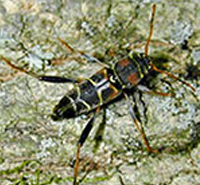
Environmental and Evolutionary Entomology
Research in this area of endeavor involves basic and applied studies of invertebrates from the perspective of their status, biodiversity, and role in the environment at various spatial scales that span specific landscapes or habitats to entire geographic ranges. It also involves the discovery and delineation of evolutionary relationships within and among certain groups of organisms. Research findings are used to provide natural and predictive classifications, contribute to biotic inventories, gain insights into historical biogeography, and understand ecological phenomena such as host and microhabitat specificity and selectivity, and behavioral patterns and adaptive capabilities associated with dispersal, colonization and survivorship. Furthermore, such studies—especially given the inherent high diversity, rapid growth and reproduction, and critical ecological roles of invertebrates—are ideally suited for investigating ecosystem services and addressing timely environmental policy and management issues including habitat protection, species rarity and conservation, effects of environmental quality and climate change, and threats of invasive species.
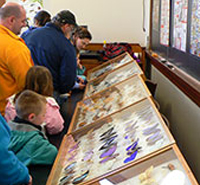
Insect Science Education
Purdue entomology has, throughout the history of the department, maintained programs of insect-science education beyond the traditional university class offerings. This effort has evolved over the years and has exposed untold numbers of people to insect science resulting in statewide, national, and international name recognition and reputation for our scientific discipline, the Entomology Department, the College of Agriculture, and Purdue University.
In addition to providing insect-science education to the general public, these programs have provided opportunities for in-service training in outreach education for departmental undergraduate and graduate students. Today a high percentage of faculty and staff contribute to the insect-science education efforts of the department. There is a growing recognition of a national need for increased scientific literacy in the general population and the need to recruit and educate future scientists from the US population. This national need and the unquestioned value of insects as the generators of excitement among the general population provides an unparalleled insect-science educational opportunity. This national need, in conjunction with our strong history of successful insect science programs in educational outreach, uniquely places the department in a position to develop a national leadership role in this area.

International Cooperation and Development
Entomology is by its very nature international; just as insects are not restrained by artificial political boundaries, neither is our Department. Our quest to discover new knowledge by necessity reaches to the far edges of the earth. That work may seek to find parasitoids to bring back to the USA to control an invasive pest insect that earlier had slipped across our borders from abroad. Or it may be to bring home innovative concepts to help combat diseases like West Nile fever. Alternatively it may have a purely humanitarian cause (e.g., helping impoverished farmers and city dwellers in Africa have enough food to eat. At the same time, our Departmental technology transfer – bringing knowledge and practical tools to bear on real-world problems – is likewise international. Making the world a better place for everyone makes it better for us as well. And since some of the best science and scientists are found overseas, it makes sense to pursue strategic international partnerships that will help push back the frontiers of knowledge.
Most of our international activities fall into the following broad areas: integrated pest management (IPM), development of biotechnological tools and their application, rural development and market-driven technology transfer, and invasive biology.
